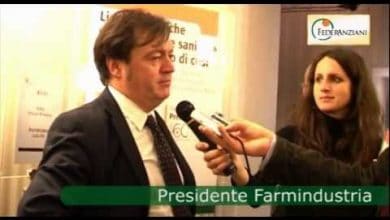
From 6 to 11.4 billion (when fully operational) would be saved with greater adherence to therapy, therefore fewer adverse events, lower access to the emergency room and hospitalization, lower pharmaceutical costs. Poor adherence to therapies is a phenomenon involving the 40% of the population
Messina: the decalogue of adherence to therapy is born today
 Early diagnosis and development of adherence to therapy can lead to savings of up to 19 billion euros for the National Health Service and a significant improvement in terms of health for the entire population of chronically ill patients. For this reason FederAnziani, the third age federation, has drawn up a handbook of adherence to therapy, the result of the work conducted with the 53 partner medical-scientific societies, with the Italian Federation of General Practitioners (FIMMG), with Federfarma, and with side of the institutions. The decalogue of adherence was presented on the occasion of the Punto Insieme Sanità meeting, held today in Rome.
Early diagnosis and development of adherence to therapy can lead to savings of up to 19 billion euros for the National Health Service and a significant improvement in terms of health for the entire population of chronically ill patients. For this reason FederAnziani, the third age federation, has drawn up a handbook of adherence to therapy, the result of the work conducted with the 53 partner medical-scientific societies, with the Italian Federation of General Practitioners (FIMMG), with Federfarma, and with side of the institutions. The decalogue of adherence was presented on the occasion of the Punto Insieme Sanità meeting, held today in Rome.
Here are the ten points: 1) recognition of the rights and duties of the chronic patient; 2) patient information and training on the therapy programme; 3) implementation of adherence monitoring on the territory; 4) simplification of therapies (drug and device) and impact on adherence of fixed drug combinations with respect to associations; 5) creation of chronic teams between GPs, specialists and pharmacists for the implementation of adherence; 6) proactive management of the patient's agenda by GPs according to the individual therapeutic plan; 7) strong integration between patient, GP, specialist and pharmacist for patient counseling and adherence monitoring; 8) specific training of the GP for taking care of the chronic patient; 9) rules dedicated to the therapeutic continuity of the chronic patient; 10) single national PDTA.
According to data from the SIC Sanità in Cifre Study Center of FederAnziani, the application of this decalogue would lead to 3.7 billion euros can be saved thanks to a more rapid emergence of the pathology, with greater prevention and a lower average cost of therapy per patient ; 3.8 billion would be recovered on the front of the reduction of diagnostics and the early start of treatment, with lower diagnostic services, shorter waiting times, greater efficiency of hospital staff; finally, from 6 to 11.4 billion (when fully operational), would be saved with greater adherence to therapy, therefore fewer adverse events, less access to emergency rooms and hospitalization, lower pharmaceutical costs.
 “Poor adherence to therapies is a multidimensional and complex phenomenon that affects the effectiveness of treatment and has a significant economic impact on the system – declares the President of AIFA Sergio Pecorelli -. It is a problem that involves the 40% of the European population and is particularly present in the elderly, who follow multiple therapies simultaneously in the face of various comorbidities. Improving adherence to therapy is a commitment that must involve everyone, from institutions to doctors, pharmacists and pharmaceutical companies. For this reason, every opportunity for discussion between the various stakeholders on this issue represents a precious opportunity to be treasured for the development of initiatives and proposals to be discussed and implemented at national and European level. In fact, I recall that Italy, with AIFA, is at the helm, together with Scotland and Spain, of the Action Group on adherence and prescription set up within the framework of the European Partnership on active and healthy ageing, which aims to "increase the average lifespan in good health by two years by 2020". “Working to improve patients' adherence to therapy is a priority, as confirmed today – continues the National Secretary General of FIMMG Giacomo Milillo -. The territorial assistance network of general practitioners and pharmacists is committed to achieving this important goal".
“Poor adherence to therapies is a multidimensional and complex phenomenon that affects the effectiveness of treatment and has a significant economic impact on the system – declares the President of AIFA Sergio Pecorelli -. It is a problem that involves the 40% of the European population and is particularly present in the elderly, who follow multiple therapies simultaneously in the face of various comorbidities. Improving adherence to therapy is a commitment that must involve everyone, from institutions to doctors, pharmacists and pharmaceutical companies. For this reason, every opportunity for discussion between the various stakeholders on this issue represents a precious opportunity to be treasured for the development of initiatives and proposals to be discussed and implemented at national and European level. In fact, I recall that Italy, with AIFA, is at the helm, together with Scotland and Spain, of the Action Group on adherence and prescription set up within the framework of the European Partnership on active and healthy ageing, which aims to "increase the average lifespan in good health by two years by 2020". “Working to improve patients' adherence to therapy is a priority, as confirmed today – continues the National Secretary General of FIMMG Giacomo Milillo -. The territorial assistance network of general practitioners and pharmacists is committed to achieving this important goal".
"Based on the results of PIS - concludes Roberto Messina, President of FederAnziani - a study on the value of adherence will be launched in 2015, along with a series of pilot projects for taking charge of the chronic patient, and the European Charter for the 'Adherence to Therapy. The data that will emerge from this process will be presented at the next Congress of the Popular Court of Justice for the Right to Health, which will take place from 20 to 22 November in Rimini".





